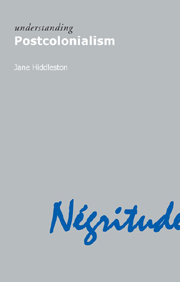Book contents
- Frontmatter
- Contents
- Acknowledgements
- 1 Introduction
- 2 Fanon and Sartre: colonial Manichaeism and the call to arms
- 3 Decolonization, community, nationalism: Gandhi, Nandy and the Subaltern Studies Collective
- 4 Foucault and Said: colonial discourse and Orientalism
- 5 Derrida and Bhabha: self, other and postcolonial ethics
- 6 Khatibi and Glissant: postcolonial ethics and the return to place
- 7 Ethics with politics? Spivak, Mudimbe, Mbembe
- 8 Conclusion: neocolonialism and the future of the discipline
- Questions for discussion and revision
- Guide to further reading
- Bibliography
- Index
6 - Khatibi and Glissant: postcolonial ethics and the return to place
- Frontmatter
- Contents
- Acknowledgements
- 1 Introduction
- 2 Fanon and Sartre: colonial Manichaeism and the call to arms
- 3 Decolonization, community, nationalism: Gandhi, Nandy and the Subaltern Studies Collective
- 4 Foucault and Said: colonial discourse and Orientalism
- 5 Derrida and Bhabha: self, other and postcolonial ethics
- 6 Khatibi and Glissant: postcolonial ethics and the return to place
- 7 Ethics with politics? Spivak, Mudimbe, Mbembe
- 8 Conclusion: neocolonialism and the future of the discipline
- Questions for discussion and revision
- Guide to further reading
- Bibliography
- Index
Summary
The Moroccan thinker Abdelkebir Khatibi and the Martinican Edouard Glissant both combine the use of deconstructive philosophy with reflection on the history of the specific postcolonial places within which they write. Highly indebted to the work of figures such as Derrida and Foucault, Khatibi and Glissant explore the cultural plurality and relationality created by colonialism, but recommendations for a generalized ethical awareness of multiple differences are here tied to a specific engagement with the effects of colonialism in the Maghreb or the French Caribbean. This attention to the conditions affecting specific places does not, however, entail a political and empirical study of an individual colonial regime, nor does it lead to a grounded form of activism. Rather, Khatibi and Glissant show how the sorts of universal ethical opening proposed by Derrida and, by extension, Levinas have particular resonance in their own regions of the world as a result of the colonial presence and the region's patchwork history. Khatibi and Glissant spend less time exploring the disjunction between the universal and the specific than Derrida, but nevertheless root their analyses in the concrete locations of the Maghreb and the Caribbean even as they derive from these analyses a broader ethics of relationality. If, then, Derrida and Bhabha swing away from politics in their universalized reflections on linguistic mastery, différance and cultural ambivalence, Khatibi and Glissant pursue the ethical opening associated with those reflections but re-anchor ethics in the particular context of regions that have been ruptured and fragmented by the colonial presence in distinct ways.
- Type
- Chapter
- Information
- Understanding Postcolonialism , pp. 126 - 150Publisher: Acumen PublishingPrint publication year: 2009



